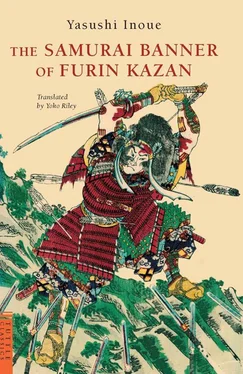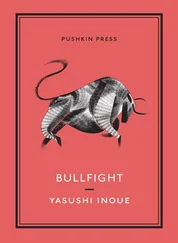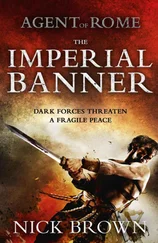Kansuke always liked this samurai, although his perception of him was not much different from others. It was a pleasant experience for Kansuke to exchange cups of sake together with a man with whom he did not have to worry about his own silence for a lengthy time. Once in a while he picked up his sake cup and let his companion pour.
Then, suddenly this reticent samurai spoke, “There is something of which I would like to ask your opinion,” said Kosaka and ordered his retainers to move farther back out of earshot.
“What is it?” Kansuke looked up and stared into the young man’s eyes.
“I would like to have a castle built about two or three miles from here.”
“Interesting,” said Kansuke calmly, but inside he was startled since his own purpose for this journey was to locate an appropriate place to build a small castle.
“A castle?” Kansuke asked.
“Yes, a castle. I do want a castle. I have a plan for building a castle of my own, but I would like to have your advice on the subject first.”
“Why do you need a castle?” asked Kansuke.
Kosaka lifted his face quietly and stared at Kansuke.
“I believe that the decisive battle against Echigo will be in this area.”
“You are right.”
“Around the Zenkoji Temple on the Uedahara Plain…”
“Maybe.”
“The area between the Sai River and the Chikuma River.”
“Indeed.”
“I believe that the war will be at the end of this year, or next spring at the latest. I think we have enough time to build a castle here.”
“Why do you think that we need a castle for this war?”
“Well,” Kosaka stopped there and continued slowly, “I would like to place Master Katsuyori in this castle and support him so that he will survive through this war. We have to prevent the Takeda from being abolished in this war.”
Without realizing, Kansuke was staring pointedly at Kosaka; the silence was deafening.
Kansuke also wanted a castle in which to place Katsuyori. But for Kansuke, his idea was to build the castle in anticipation of a victory. It was a castle to station a small troop of warriors who would deal the final blow to the retreating Echigo army. It was the castle which would give Katsuyori an opportunity of a triumphant victory and honor. But Kosaka had the exact opposite in mind. It was an idea built in anticipation of the Takeda’s defeat.
“So, you think our allies will be defeated?” asked Kansuke.
“Nine chances out of ten. It will be difficult to win,” said Kosaka without any hesitation.
“For what reason?”
“In this battle, there is no doubt that both the Takeda army and the Echigo army will fight to the last samurai. Judging from this endless confrontation and also from the personality of our lord and of Uesugi Kenshin, there won’t be any possibility that either one of them would withdraw their army partway through the war.”
“That is quite obvious. I believe you are right on that score.”
“One has to win and another has to lose. And if one has to lose…”
“It will be our side, you think.”
“Yes.”
“Our Takeda will be defeated?!”
“The Takeda have not yet had experience in difficult wars. So far, we have always won battles through strategy; a smaller army winning over their larger enemy and destroying them with very little damage to our own army. However, with this decisive battle against Echigo, we will not know the result until the very end. Both will lose almost all of their warriors, and the camps and fortresses will fall into total confusion and disorder. Here and there, victory or defeat will be decided. A strategy will no longer mean anything. It will be a man-to-man battle of life or death. The Echigo army is used to constant scuffles and dogfights against the followers of Ikko Buddhism 85; they will win and our inexperienced army that is not accustomed to this kind of scuffle will lose.
Kosaka stopped speaking right there. His words sounded insolent, but Kansuke admired him for having said them despite this.
Kansuke contemplated Kosaka’s words in silence. He felt as if the young general, to whom he had never paid very much attention, had unexpectedly touched a sensitive spot. Kosaka continued, mumbling again in a low expressionless voice, “If the Takeda loses, excuse me for saying this, but it will be inevitable that our lord, Master Yoshinobu and all of his family members will die in the battle. But the youngest Takeda must live without severing the Takeda line. Master Katsuyori has to be saved.
Nobody will blame him for the loss. To let him escape beyond the reach of his enemy, we need a castle to keep our enemies away, to allow the young master time to escape.”
“I understand,” Kansuke said bluntly. “I shall help you as much as possible to build the castle as you wish.” Then he fell silent. Kansuke occasionally filled Kosaka’s cup, and in return Kosaka filled Kansuke’s cup. But, the silence continued unabated.
On the vast river beach, the warriors were scattered around, divided into several groups. A relaxed satisfaction was felt among those retainers who were on their way back from the triumphant battle. It was the first time that Kansuke had actually felt his age since he had begun his service under the Takeda. He felt he was no match for Kosaka.
Kosaka’s words precisely pointed out the weaknesses of the Takeda army. Shingen had been conquering the surrounding fiefdoms by an ingenious strategy, and now on account of that the Takeda had fallen into a dangerous position. Nobody else saw it, but it was clear in Kosaka Masanobu’s eyes.
Kosaka’s words were also painful to Kansuke himself. Kosaka’s words mercilessly criticized Kansuke’s strategy, which he had provided until now to the Takeda Clan. Indeed, a strategy that would no longer be useful in the war against Kenshin. As a strategist, Uesugi Kenshin also excelled. As far as strategy was concerned, both Shingen and Kenshin were indeed equal. The fact, which would decide the winner, was the tenacity of the last samurai in a pitched battle. It depended on their ability to fight. As Kosaka said, Shingen and also his legitimate son, Yoshinobu, might die in the battle. Kansuke himself, as well as other old loyal servants, might expose their dead bodies on the battlefield at Kawanakajima.
Kansuke had never thought about defeat. In all of his previous wars, he had always thought only of victory. That confidence suddenly disappeared from his sixty-eight-year-old body as if an evil spirit that had possessed him for a long time had suddenly disappeared. Under the glorious spring sun, the small sake banquet lasted for about an hour longer. Neither of them spoke another word.
From there, Kansuke left for Amakazari Castle along with Kosaka. Kansuke wanted to stay with this young general a little longer.
Kansuke returned to Kofuchu afterward, and this time he took enough people to build a castle and left for northern Shinano again. It was June.
However, halfway through the construction, Kansuke had to go back to Kofuchu. It was because they had received news that while Uesugi Kenshin was in Kyoto visiting the Shogun, Nagai Masakage, who lived in Kasugasan Castle, had invaded the Togakushi area, which was within the boundaries of the Takeda Clan. Northern Shinano, just recently conquered at the hands of Kosaka, was about to become a battlefield again.
In mid July, Kansuke left Kofuchu and stationed himself at Komuro Castle along with Shingen and his warriors. In the meantime, Uesugi Kenshin returned from Kyoto and joined those at Kasugasan Castle. At this point, it seemed inevitable that the clash between the two powerful daimyo would take place.
Kansuke, however, did not forget the words of Kosaka.
Before the collision of both armies, a castle had to be built in the lands of northern Shinano. Although Shingen was eager to move his headquarters to Komuro rather than stay in Kofuchu, Kansuke held him in Kofuchu. He was afraid of provoking Kenshin.
Читать дальше












